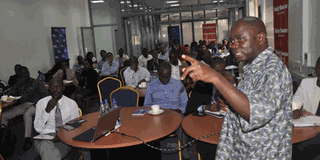SMEs advised on business survival

Mr Fred Muhumuza, an economist (right), addresses business people about the state of the economy during the Top 100 Mid-sized companies Club 2016 forum at the KPMG head offices at Rwenzori Towers yesterday. PHOTO BY STEPHEN OTAGE
What you need to know:
Partnership. Economists advised the enterprises to take advantage of their large numbers and merge if they are to survive.
Kampala.
Amid the latest economic stress, economists have alerted Small and Medium-sized Enterprises (SMEs) to tap into current government priorities to benefit from the planned investments.
Uganda’s economy has witnessed slowed growth, depreciation of the Uganda Shilling coupled with a high interest rate environment that has in turn, affected businesses.
Mr Fred Muhumuza, an economist, said borrowing in Uganda is still costly. Deposits in Uganda, for instance, are largely short-term and hence not good for lending.
“As of August 31, 2016, rediscount rate for borrowing from Bank of Uganda is 18 per cent while overnight rate from peers is 12.4 per cent,” Mr Muhumuza yesterday said during the Top 100 mid-sized companies’ forum themed: ‘The rise of Uganda’s economy and the implications business growth and performance.’
Global effect
Mr Muhumuza said the economic slowdown is as a result of knock-on effects from the global economy.
“The Americans are not doing well, the Europeans and the Chinese too. China was really hungry for money in terms of resources so when they do not do as well, that means the problems trickle down to us and we need to respond to some of these dynamics,” Mr Muhumuza said.
He said for the companies to grow, they must tap into the linkages because within SMEs since there is always safety in big numbers.
“They need to stop looking at their peers as rivals, you may want to merge together in some cases so that you can survive in the industry,” the economist said.
Infrastructure, health, education and energy are some of government’s key priorities towards attaining development. The sectors form the basis of government investment and expenditure.
According to Mr Richard Walusimbi, an audit manager at KPMG, this should impact on the decisions of SMEs because government is the largest buyer of goods and services.
“When you look at the National Development Plan, annual budgets and where government is focusing resources, it gives directions in terms of where your investment decisions should be focused,” he said.
About survey
A brainchild of KPMG and Daily Monitor, the Top 100 Survey, now in its 8th edition, seeks to identify Uganda’s fastest growing medium sized companies to showcase business excellence and highlight some of the country’s most successful entrepreneurship stories.




